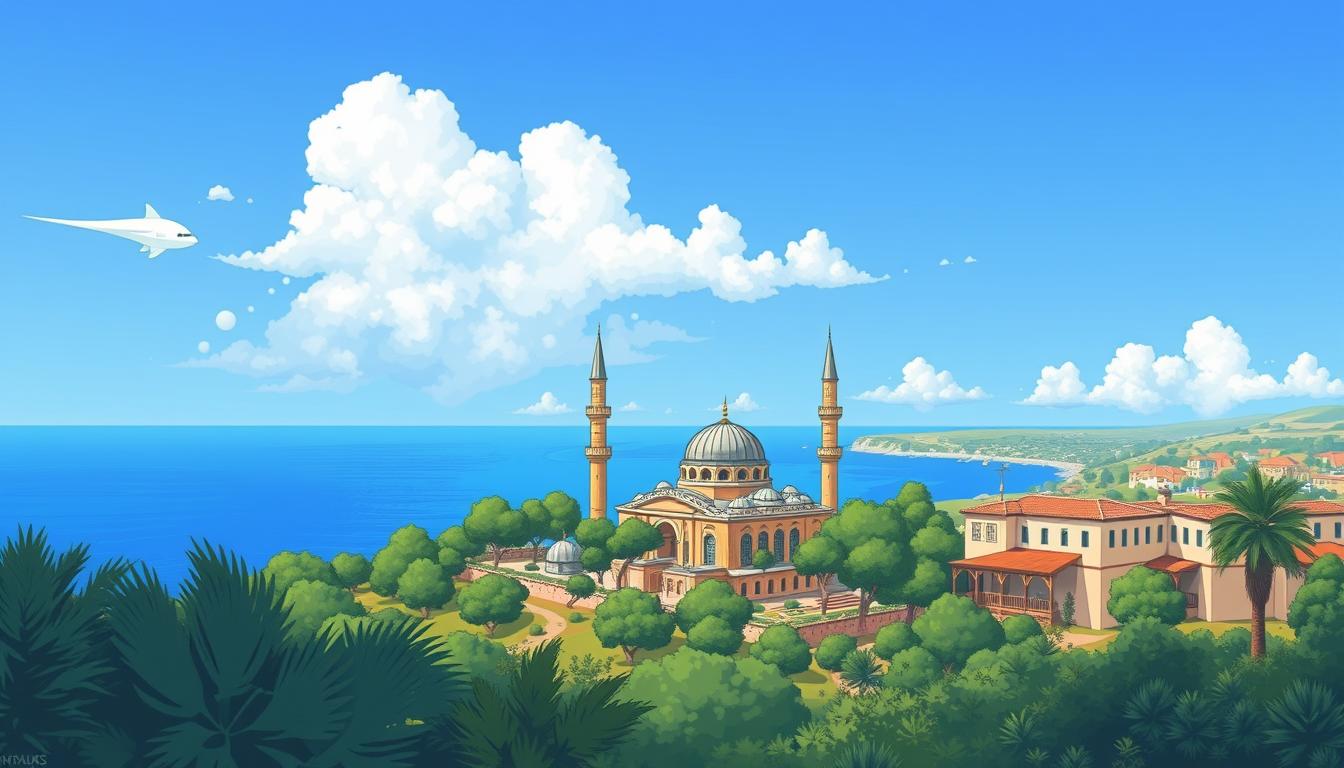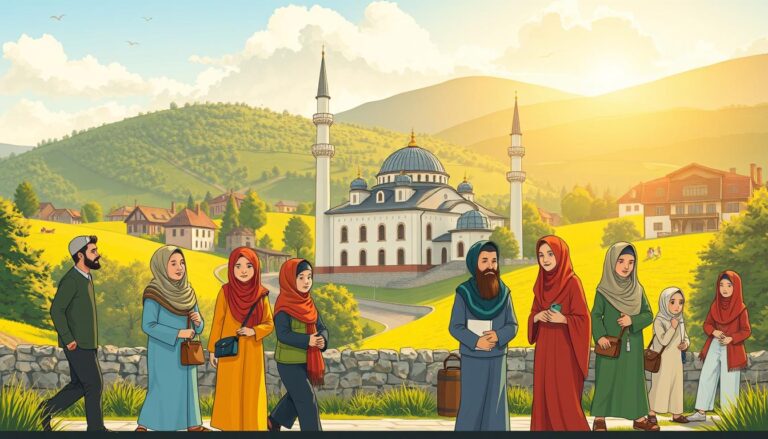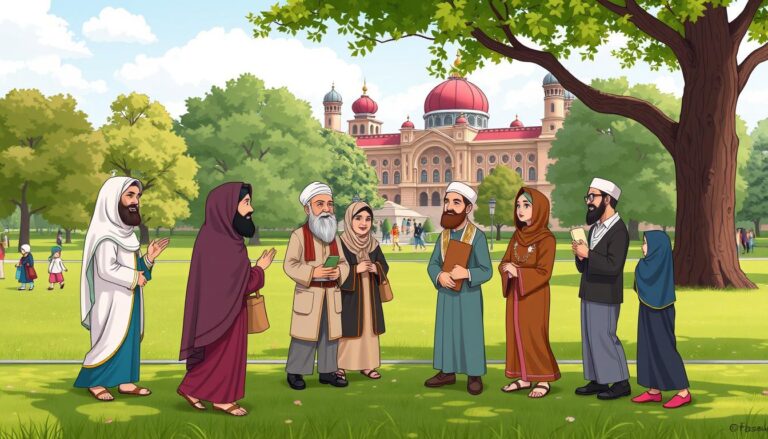Islam in Cyprus
The island of Cyprus, with its vibrant tapestry of cultures and faiths, holds a fascinating story about the presence and influence of Islam. Despite Cyprus being predominantly a Christian-majority country, the Muslim community has maintained a significant foothold, dating back centuries to the arrival of the faith on the island. With the Turkish Cypriot population making up a sizable portion of the island’s inhabitants, the impact of Islam on Cypriot society is undeniable.
In fact, the Hala Sultan mosque in Nicosia, set to open its doors soon, will have the capacity to accommodate an astounding 3,000 worshippers, showcasing the scale of the Muslim community’s presence on the island. This remarkable statistic sets the stage for an in-depth exploration of the intricate relationship between Islam and the diverse tapestry of Cypriot culture.
Key Takeaways
- Islam is the second-largest religion in Cyprus, with a significant presence in the Turkish Cypriot community.
- The island has a long and complex history of Islamic influence, dating back to the arrival of the faith centuries ago.
- The Turkish Cypriot society is largely secular, with adherents to the Sunni branch of Islam and a strong influence of Sufism.
- Concerns have been raised about the increasing influence of Sunni Islam and the impact on the Turkish Cypriot community’s cultural identity.
- The island’s religious landscape is diverse, with various recognized and unrecognized faith communities coexisting under the framework of the Cypriot constitution.
Introduction
The historical presence of Islam in Cyprus is a rich and significant facet of the island’s cultural tapestry. From the early Arab expeditions to the establishment of Muslim communities during the Ottoman era, Islam has left an indelible mark on the island’s history and society. This article aims to provide an insightful overview of the role and impact of Islam in Cyprus, exploring its deep roots, demographic shifts, and the current state of the Muslim community.
Brief Overview of Islam’s Historical Presence in Cyprus
Islam’s connection to Cyprus dates back to the 7th century, when the island was subject to early Arab expeditions and conquests. The establishment of Muslim communities on the island occurred during the Ottoman rule in the 16th century, which saw the rise of a significant Turkish Cypriot population. Over the centuries, the island has witnessed the coexistence of various religious groups, including Christians, Muslims, and others, shaping its unique multicultural heritage.
Significance of the Topic and Outline of the Article
Examining the historical presence and contemporary significance of Islam in Cyprus is crucial for understanding the island’s rich diversity and the complex interplay of religious and cultural influences. This article will delve into the demographic shifts, the influence of different Islamic sects, the role of religious sites and landmarks, and the challenges and controversies surrounding the Muslim community in Cyprus. By exploring these aspects, readers will gain a comprehensive understanding of the pivotal position of Islam within the Cypriot landscape.
“The history of Islam in Cyprus is a tapestry of cultural exchange and religious coexistence, woven through centuries of dynamic interactions.”
Historical Background
The history of Islam’s presence in Cyprus is deeply rooted, dating back to the early arrival of the religion on the island. According to legend, Umm Haram, an aunt of the Prophet Muhammad, accompanied one of the first Arab expeditions to Cyprus and was later buried there. The Hala Sultan Tekke monument now stands at the site where she is said to have been laid to rest.
The island’s fate shifted dramatically in 1570 when it fell under the control of the Ottoman Empire. This conquest led to the influx of mainland Turks, who arrived as soldiers and administrators. This influx of Turkish settlers played a crucial role in establishing Muslim communities throughout Cyprus, which had previously been dominated by a predominantly Greek Orthodox Christian population.
Early Arrival of Islam and the Influence of Umm Haram
The story of Islam’s early presence in Cyprus is inextricably linked to the legend of Umm Haram, the aunt of the Prophet Muhammad. According to this legend, Umm Haram accompanied one of the first Arab expeditions to Cyprus and was subsequently buried on the island. The Hala Sultan Tekke, a prominent Muslim shrine, now stands as a testament to her legacy and the early arrival of Islam in Cyprus.
Ottoman Conquest and the Establishment of Muslim Communities
The island’s landscape was dramatically altered in 1570 when the Ottoman conquest of Cyprus took place. This event marked the beginning of a significant demographic shift, as the influx of mainland Turks, both as soldiers and administrators, helped establish thriving Muslim communities in Cyprus. These communities gradually integrated with the existing Greek Orthodox Christian population, shaping the island’s religious and cultural tapestry.
“The arrival of the Ottomans in Cyprus ushered in a new era of Islamic influence on the island, laying the groundwork for the enduring presence of Muslim communities in Cyprus.”
Demographics and Statistics
The Muslim population in Cyprus comprises a significant portion of the island’s diverse religious landscape. According to the 2011 census, Muslims make up around 1.8% of the population in the government-controlled areas of Cyprus. However, the overall Muslim population on the island is estimated to be around 25% of the total population.
Muslim Population Estimates in Cyprus
The Turkish Cypriot community, which resides primarily in the northern part of the island, is predominantly Sunni Muslim, with a significant Sufi influence. There is also a smaller Alevi Muslim community, as well as a few Turkish Cypriots who are Ahmadi Muslims.
Distribution of Sunni, Sufi, and Alevi Muslims
- Sunni Muslims: The majority of the Turkish Cypriot community in the north follows the Sunni branch of Islam.
- Sufi Muslims: The Sufi influence is significant among the Turkish Cypriot community, with the Naqshbandi-Haqqani order being particularly prominent.
- Alevi Muslims: There is a smaller Alevi Muslim community in Cyprus, primarily composed of immigrants of Turkish, Kurdish, and Arab origin and their descendants.
The religious landscape in Cyprus reflects the island’s diverse history and the various communities that have settled here over the centuries. Understanding the demographics and statistics of the Muslim population provides valuable insights into the role of Islam in Cypriot society.
Islam in Cyprus
The Turkish Cypriot community, which constitutes the majority of the Muslim population in Cyprus, predominantly follows the Sunni branch of Islam. However, Sufism has also played a significant role in the spiritual heritage and development of the Turkish Cypriot Muslims.
Sunni Islam and the Turkish Cypriot Community
The northern, Turkish Cypriot community is estimated to be around 270,000 strong. Since the Turkish invasion in 1974, the Muslim population in the north of Cyprus has been augmented by settlers from Turkey who are predominantly Sunni Muslims. This has contributed to the continued dominance of Sunni Islam within the Turkish Cypriot community.
Sufi Influence and the Naqshbandi-Haqqani Order
The Naqshbandi-Haqqani Sufi order, led by the late Nazim al-Qubrusi, had a significant presence on the island, with the order’s headquarters located in Lefka. The influence of Sufism is evident in the spiritual practices and traditions of many Turkish Cypriot Muslims, complementing the predominant Sunni beliefs.
Over 400 imams have been sent to Cyprus as missionaries to target the children of settlers in efforts to change the education system and cultural identity.
- The Hala Sultan mosque in Nicosia is said to be able to accommodate 3,000 worshippers.
- Mass rallies outside the Turkish Cypriot parliament have been mostly attended by young people protesting attempts by Ankara to impose Islamic norms through policies like single-sex swimming pools at universities.
- Turkish Cypriots have been acquiring Republic of Cyprus passports to seek EU citizenship following the collapse of peace talks and the rejection of reunification by the majority Greek population on the island.
The influence of Sufism, represented by the Naqshbandi-Haqqani order, has been a significant aspect of the religious landscape in Cyprus, particularly within the Turkish Cypriot Muslim community.
Religious Sites and Landmarks
Cyprus is home to several significant Islamic shrines and landmarks that offer a glimpse into the island’s rich religious history. Among the most notable are the Arabahmet Mosque in Nicosia, the Hala Sultan Tekke/Umm Haram Mosque in Larnaca, and a number of former Catholic cathedrals from the Crusader era that were converted to mosques after the Muslim conquest of the island.
Arabahmet Mosque in Nicosia
The Arabahmet Mosque in Nicosia is a 16th-century structure that stands as a testament to the enduring presence of Islam in Cyprus. Built during the Ottoman rule, this mosque remains an important religious site for the island’s Muslim community, serving as a place of worship and cultural significance.
Hala Sultan Tekke/Umm Haram Mosque in Larnaca
Situated approximately 6 kilometers southwest of Larnaca city, the Hala Sultan Tekke/Umm Haram Mosque is another iconic Islamic landmark in Cyprus. The mosque complex, which includes a minaret, cemetery, mausoleum, and living quarters, was first established in 1760 AD by an Ottoman dervish named Sheikh Hassan. The current mosque structure was built in the classical Ottoman architectural style in 1816.
Converted Mosques from the Crusader Era
In addition to the Arabahmet Mosque and Hala Sultan Tekke/Umm Haram Mosque, Cyprus is home to several former Catholic cathedrals from the Crusader era that were converted to mosques after the island’s conquest by Muslim forces. Notable examples include the Lala Mustafa Pasha Mosque, Selimiye Mosque, and Haydarpasha Mosque, all of which have been repurposed as important Islamic sites in Cyprus.
“The Hala Sultan Tekke Mosque is a significant religious site for Muslims in Cyprus, attracting thousands of visitors each year.”
Turkish Settlers and the Impact on Demographics
The Turkish invasion of Cyprus in 1974 has significantly impacted the island’s demographics, with a substantial influx of settlers from Turkey. These settlers, who are almost exclusively Sunni Muslims, have bolstered the Muslim population in the northern part of the island. The status of these settlers is a matter of controversy under international law, as the transfer of populations by states to engineer changes in the demographic makeup of other states is prohibited under the Geneva Convention.
According to estimates, the Turkish Cypriot population in Northern Cyprus is around 150,000. However, the total Turkish Cypriot diaspora population, including descendants, is much higher, ranging from 300,000 to over 650,000 in Turkey, and between 300,000 to 400,000 in the United Kingdom. Smaller Turkish Cypriot communities can also be found in countries like Australia, Canada, and the United States.
The demographic changes brought about by the Turkish settlers have had a significant impact on the island’s religious and cultural landscape. Prior to the 20th century, Muslim Turkish Cypriots made up around 75% of the island’s population, but this percentage has declined over time due to factors such as mandatory military service in the Ottoman army and emigration to Anatolia. The influx of Turkish settlers has helped to maintain a sizable Muslim community in the north, but it has also been a source of contention and controversy.
“The transfer of populations by states to engineer changes in the demographic makeup of other states is prohibited under the Geneva Convention.”
The impact of Turkish settlers on the demographics of Cyprus is a complex and sensitive issue, with implications for the island’s political, social, and cultural dynamics. As the debate over the status of these settlers continues, it is important to understand the historical context and the ongoing challenges faced by the various communities on the island.
Islam in Government-Controlled Areas
In the government-controlled areas of Cyprus, the Muslim population is primarily composed of Arab immigrants and refugees, who are unrelated to the historically Turkish Cypriot Muslim community. These communities have established a presence in the southern part of the island, which is under the control of the Republic of Cyprus.
Arab and Refugee Muslim Communities
According to recent census data, the population in the government-controlled area of Cyprus is over 858,000, with 89% being Greek Orthodox Christians and 1.8% Muslims. This Muslim minority consists largely of Arab immigrants and refugees, who have settled in the southern part of the island.
The government has taken steps to protect and preserve Muslim places of worship in the region. From 2000 to 2006, the Turkish Cypriot Properties Management Service of the Cyprus Government spent significant funds on the restoration and maintenance of mosques across the districts of Nicosia, Limassol, Larnaca, and Paphos. Furthermore, the Department of Antiquities has allocated annual expenses for the conservation of Muslim sites declared as Ancient Monuments.
In total, there are 101 mosques under the protection of the Government in the government-controlled areas since 1974, with 17 of them being declared Ancient Monuments. These efforts demonstrate the government’s commitment to safeguarding the religious heritage and ensuring the well-being of the Muslim communities in government-controlled areas of Cyprus.
While the Arab and refugee Muslims in Cyprus have found a home in the southern part of the island, the larger Turkish Cypriot Muslim community remains concentrated in the northern, Turkish-controlled region. The government-controlled area has also seen a small presence of followers from other religious traditions, including Greek Orthodox, Maronite Catholics, Armenians, and Bahais, among others.
Religious Freedom and Interfaith Dialogue
Cyprus is known for its commitment to religious freedom and interfaith cooperation. The Constitution of Cyprus prohibits religious discrimination and protects the freedom to worship, teach, and practice one’s religion. The government grants the Greek Orthodox Church of Cyprus and the Vakf (an Islamic institution) the exclusive right to regulate and administer their internal affairs.
While the government has taken steps to facilitate access to religious sites and promote interfaith dialogue, there have been some challenges. In the past, a mosque in Paphos was closed, and there have been instances of discrimination against minority religious groups. However, the country scored 4 out of 4 for religious freedom in 2023, indicating a positive trend.
Legal Protections and Government Practices
The Constitution of Cyprus ensures religious freedom and prohibits religious discrimination. The government provides financial support for the maintenance of mosques in government-controlled areas. Clergy from recognized religious communities are authorized to conduct marriages and sign marriage certificates.
Efforts towards Promoting Interfaith Cooperation
The government has made efforts to foster interfaith dialogue and cooperation. This includes facilitating access to religious sites and promoting shared understanding between different faith communities. However, some challenges, such as the closure of a mosque in Paphos, have highlighted the need for continued progress in this area.
“Cyprus is known for its commitment to religious freedom and interfaith cooperation, with the government taking steps to protect the rights of all faith communities.”
Overall, the religious landscape in Cyprus is diverse, with the majority of the population identifying as Greek Orthodox Christians, followed by smaller communities of Muslims, Catholics, Protestants, Buddhists, and other faiths. The government’s policies and practices aim to ensure the protection of religious freedom and promote interfaith dialogue across the island.
Challenges and Controversies
The Muslim community in Cyprus faces a range of challenges, including restricted access to religious sites and reports of discrimination. Muslim leaders have voiced concerns that the government continues to limit their community’s access to only a small number of the 19 mosques located on cultural heritage sites in the government-controlled areas.
Additionally, there have been troubling accounts of physical attacks and threats against Muslim students, as well as instances of anti-Semitic threats and verbal harassment directed at the Jewish community. Some religious minority groups have even reported pressure to participate in the religious ceremonies of the majority groups.
These issues highlight the ongoing struggles the Muslim community in Cyprus faces in terms of accessing their places of worship and ensuring their religious freedom is respected. The lack of full access to religious sites and the reports of discrimination underscore the challenges this community continues to grapple with.
Access to Religious Sites and Discrimination Concerns
- Limited access to 19 mosques on cultural heritage sites in government-controlled areas
- Reports of physical attacks and threats against Muslim students
- Instances of anti-Semitic threats and verbal harassment against the Jewish community
- Pressure on some religious minority groups to participate in majority group ceremonies
These concerns reflect the ongoing challenges facing the Muslim community in Cyprus, as they strive to maintain their religious practices and secure their rightful place in the island’s diverse cultural landscape.
“The lack of full access to religious sites and the reports of discrimination underscore the challenges this community continues to grapple with.”
Cultural Impact and Traditions
The Muslim community in Cyprus has a rich cultural heritage that has significantly influenced the island’s traditions and celebrations. Islamic festivals and holidays, such as Eid al-Fitr, Eid al-Adha, and Mawlid al-Nabi, have become an integral part of the Cypriot cultural landscape.
These Islamic festivals in Cyprus are celebrated with great fervor and enthusiasm, bringing together the Muslim community and often involving the broader Cypriot society. The vibrant celebrations, which include feasting, gift-giving, and community gatherings, have become an important aspect of the island’s cultural identity.
Beyond the observance of religious festivals, the influence of Islam on Cypriot culture can be seen in various aspects of the island’s architecture, cuisine, and social customs. The long-standing presence of Islam in Cyprus has left an indelible mark on the country’s rich cultural tapestry, lending a unique blend of Eastern and Mediterranean influences to the Islamic traditions in Cyprus.
“The cultural exchange between the Muslim and non-Muslim communities in Cyprus has been a remarkable testament to the island’s tradition of tolerance and coexistence.”
This intermingling of cultures has fostered a spirit of understanding and appreciation, with both the Turkish Cypriot and Greek Cypriot communities embracing the diverse heritage that defines the island’s identity. The Islamic festivals in Cyprus and the broader influence of Islam on Cypriot culture continue to enrich the lives of all Cypriots, serving as a testament to the enduring legacy of religious and cultural diversity on the island.
Conclusion
The rich and influential history of Islam in Cyprus is a testament to the island’s diverse cultural and religious landscape. From the early Arab expeditions to the Ottoman conquest, the Muslim population has played a significant role in shaping the island’s identity. Today, the Muslim community, which comprises around 25% of the total population, continues to be an integral part of Cyprus’s cultural and social fabric.
While the Muslim community in Cyprus has faced various challenges, such as limited access to religious sites and instances of discrimination, the government has taken steps to protect religious freedom and promote interfaith dialogue. The bi-communal structure of the Republic of Cyprus, established as a compromise solution in 1960, recognizes the political equality of Greek and Turkish Cypriots, further solidifying the island’s unique and distinct identity.
As Cyprus continues to evolve, the role and influence of Islam in the country’s cultural and social landscape will likely remain an important and enduring aspect of the island’s identity. The summary of key points underscores the significance of understanding the history, demographics, and current state of Islam in this Mediterranean island nation.
Source Links
- ‘We’re not Muslim enough’ fear Turkish Cypriots as poll looms
- Cyprus – United States Department of State
- Islam in Cyprus
- Religion in Northern Cyprus
- Islam In Cyprus
- Religion in Cyprus
- Cyprus – United States Department of State
- National Profiles | World Religion
- Cyprus Population 2024 (Live)
- Area Administered by Turkish Cypriots – United States Department of State
- Turkish Cypriots split over Islam’s rise in northern Cyprus
- Hala Sultan Tekke: Muslim Holy Site and a Historic Landmark of Cyprus
- CYPRUS 2017 INTERNATIONAL RELIGIOUS FREEDOM REPORT
- demographic situation, languages and religions
- Turkish Cypriots
- Embassy of the Republic of Cyprus in Doha
- Freedom of religion in Cyprus
- Cyprus – United States Department of State
- USDOS – US Department of State (Author): “2021 Report on International Religious Freedom: Cyprus—Republic of Cyprus”, Document #2074040
- Cyprus problem
- Cyprus-Turkey: Growing Tensions
- Cyprus – Culture, Religion, Cuisine
- Cypriot – Religion
- Cyprus – United States Department of State
- Cyprus (Historical Overview) / Republic of Türkiye Ministry of Foreign Affairs







